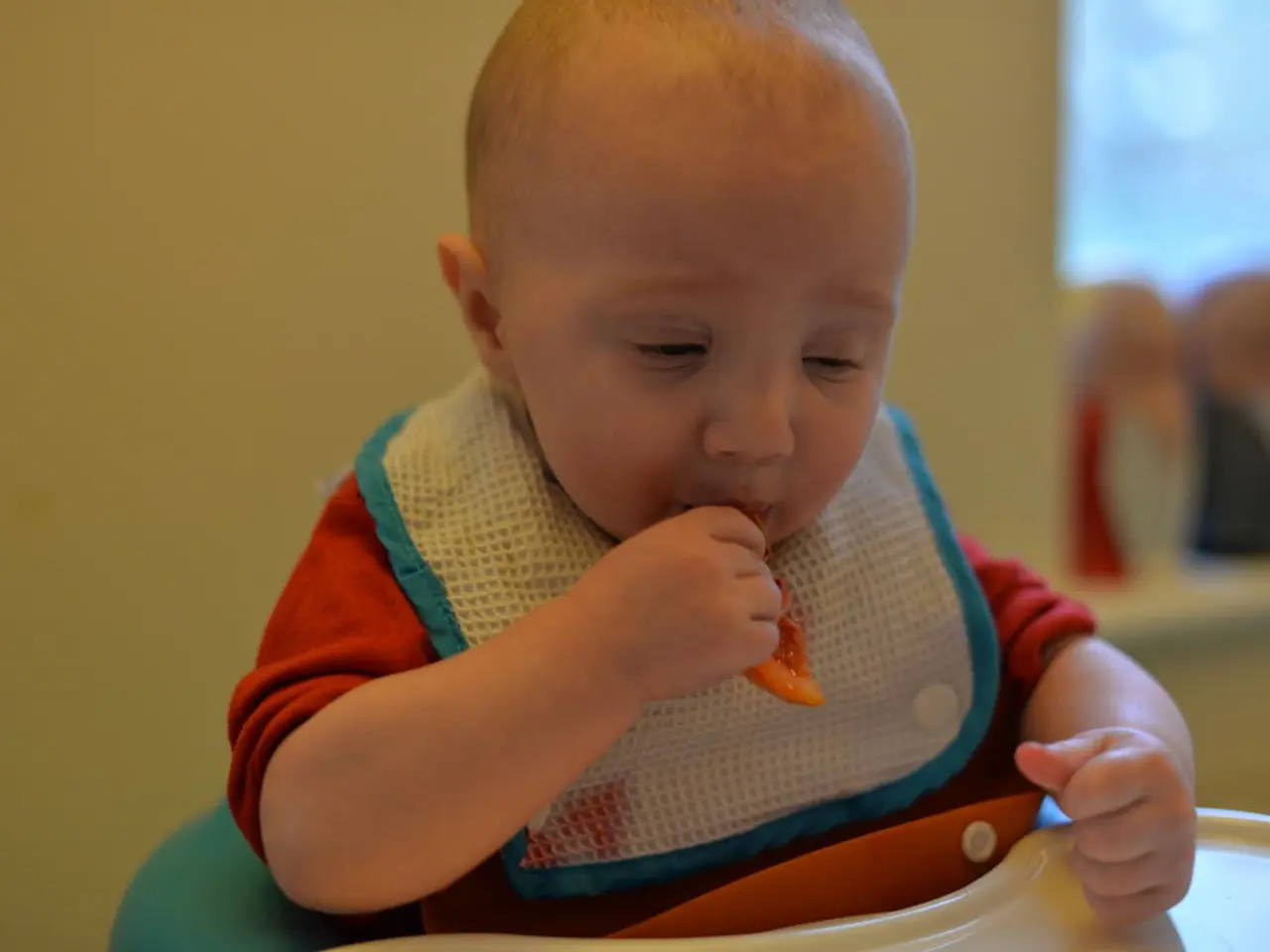Introducing Solids to Babies: Guidelines for Starting the Process
Introducing Solid Foods to Babies: A Guide for Caregivers
As a caregiver, you might be wondering when and how to introduce solid foods to your baby. Here's a comprehensive guide based on recommendations from the American Academy of Pediatrics (AAP) and the American Academy of Allergy Asthma & Immunology (AAAAI).
When to Start
The AAP and AAAAI suggest introducing solid foods to babies around 6 months of age, once they show developmental readiness such as good head and neck control, the ability to sit with little support, and interest in food. However, every baby is unique, and some may be ready sooner.
Preparing for Solid Foods
Before starting solids, ensure your baby can grasp foods in their hands and bring them to their mouth. Start with soft, easy-to-hold foods that can be mashed with their gums. Some good candidates for a baby's first foods could include mashed banana, sweet potato, stewed apples or pears, soft green vegetables, rice or oat cereals fortified with iron.
Food Choices
Introduce iron-rich foods early, such as iron-fortified cereals and meats, since babies need more iron than breast milk or formula provides at this stage. Early introduction of common allergens like peanuts, eggs, dairy, and wheat is also recommended to lower allergy risk, with regular exposure to these foods encouraged.
Avoiding Choking Hazards
Do not offer hard candies, nuts, whole grapes, raw carrots, hot dogs, or similar foods that pose choking risks until around 4 years of age. Honey should be avoided before 1 year due to botulism risk. Also, avoid cow's milk and added sugars/salts before age 1.
Feeding Approach
Introducing solids is a gradual process, requiring multiple exposures to new foods to encourage acceptance. Family mealtime with shared foods can help babies learn by example. The AAP recommends giving 4 ounces, or 113 grams, of solid foods per meal.
Special Cases
In some cases, it is a good idea for caregivers to consult a pediatrician before starting solids, particularly if a baby was preterm or has special needs.
Dealing with Fussy Eaters
If a baby is happy eating some foods but not others, a caregiver can try mixing the new food with something they like, continuing to offer less popular foods at mealtimes until they show interest, or waiting a week before trying the new food again. If the baby refuses to eat the food, cries, or keeps turning away, do not make them eat. Instead, go back to feeding with milk or formula exclusively and try again later.
Allergen Introduction
The AAAAI advises that caregivers can give babies single-ingredient baby food from 4-6 months and introduce common allergens before 6 months. If they get on well with the food, caregivers should keep offering it to the baby at mealtimes, alongside milk or formula.
Avoiding Fruit Juice
The AAP also states that babies do not need fruit juice and recommends avoiding giving any until they are at least 12 months old due to their sugar content.
Safety Precautions
When introducing baby food, it is best to offer single-ingredient purees, trying them one at a time. To prepare baby food, wash the hands before preparing the food, blend or mash the ingredient to a smooth texture, cook the food thoroughly and allow it to cool until lukewarm, wash the baby's hands, sit them down with a bowl and baby spoon, try to guide half a spoonful of food into the baby's mouth, stay with the baby at all times while they eat to monitor for signs of choking or an allergic reaction, finish the meal with breast milk or formula, and wash the bowls, utensils, and spoon in hot soapy water when finished.
After 6 Months
After 6 months, the iron stores start to reduce, and babies need to start eating solid foods to meet their nutritional needs. If a baby refuses many or all foods, particularly after eating solids with little trouble, they may have another issue such as teething, an ear infection, a cough or cold, tummy problems.
In summary, solid foods should be introduced around 6 months when the baby is developmentally ready, starting with iron-rich and allergenic foods to support nutrition and allergy prevention, while continuing breastfeeding or formula feeding as the main source of calories. Choking hazards, honey, cow's milk, and added salt or sugar should be avoided in the first year.
- As a caregiver, start introduced solid foods to your 6-month-old baby once they show readiness, such as good head and neck control and the ability to sit with little support.
- Before starting solids, ensure your baby can grasp food in their hands and bring it to their mouth, and start with soft, easy-to-hold foods, such as mashed banana or iron-fortified cereals.
- Introduce iron-rich foods, like iron-fortified cereals and meats, early to meet the baby's increased iron needs, and consider introducing common allergens like peanuts, eggs, dairy, and wheat to lower allergy risk.
- Avoid giving choking hazards, like hard candies, nuts, hot dogs, or raw carrots, until around 4 years of age, and be mindful of avoiding honey before 1 year due to the risk of botulism.
- Encourage a gradual acceptance of new foods by offering them multiple times and family mealtime, as suggested by the American Academy of Pediatrics (AAP), and consult a pediatrician before starting solids if the baby was preterm or has special needs.




